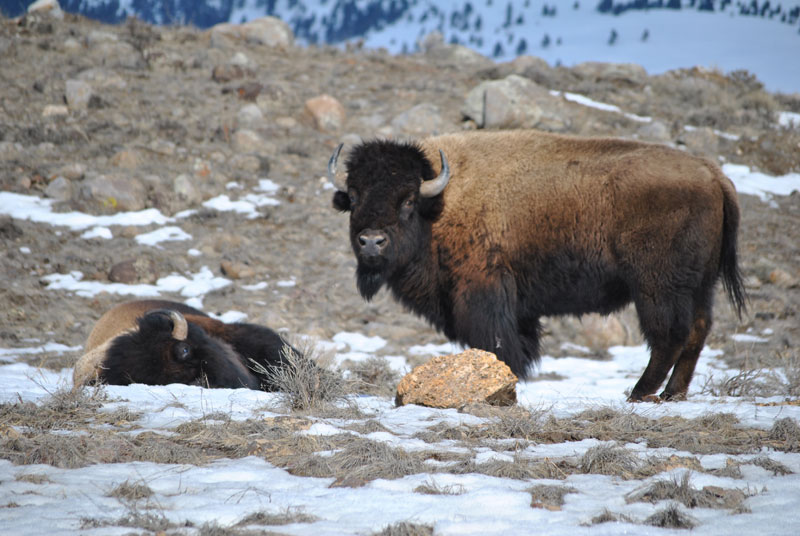For the third straight October, wild buffalo families are already beginning to migrate from Yellowstone into Montana. Until these recent years, it was extremely rare for the matriarch-led family groups to leave the park so early. They have traveled many miles to their new year-round habitat on Horse Butte, causing BFC and local residents to both celebrate and become increasingly vigilant, watching out for threats. As we feared, within a day of the buffalo being spotted, hunters arrived. Luckily, the buffalo have many people looking out for them. But the hunters and game wardens are watching closely, too, possibly being tipped off by the local Montana Department of Livestock agent and the state-run “buffalo hunt hotline.” Already, six bulls have been killed, and, after such a “welcome," the remaining buffalo are making their way back towards Yellowstone. With this canned hunt, fair doesn’t even come into play and the buffalo don’t stand a chance with so much stacked against them, including hunters racing against Yellowstone’s buffalo trap which the Park Service intends to open earlier than usual this year.
As we stand on the edge of another season, when many hundreds of buffalo will likely either be gunned down or captured and sent to slaughter, we would like to re-awaken the concept and practice of The Honorable Harvest, and remember our responsibility to other beings on this Earth. One example is from the tribes of the Pacific Northwest. When the salmon were about to return from the ocean to the rivers of their birth the people would light beacon fires on the headlands to help them find their way. As these elders swam from ocean to rivers, the people would sing them welcoming songs in gratitude for their return. They would also watch as the fish swam by, refraining from taking a single one for at least four days. This ensured that the salmon would be able to complete their journey to lay and fertilize the eggs who would later return to the ocean, completing the cycle. After this life-giving task was completed, the elder fish would die, their life spent and it’s purpose nearly complete. Those bodies of the dead fish who made it so far up river were also feeding the forest from the bellies of grizzly bears, the people, ravens, eagles, wolves, and others who consume their flesh. The forest in turn offered shade to the life-giving waters, offering life to the fish, who offers life to the people, who would offer life back to the salmon.
This reciprocal relationship is known as the Honorable Harvest. It is something that we have largely forgotten. Imagine if, when the buffalo first arrived into Montana, rather than being descended upon with rifles and traps, we sang them welcoming songs. Imagine if instead of killing every buffalo who walked across the government’s man-made line, we let them pass freely, for days and weeks, allowing them to continue on their journeys, giving them life before ever asking them to give us theirs. Do people even ask anymore? We have become a culture of takers, but it is never too late to find our way again. It is time to embrace The Honorable Harvest. It is time to re-enter true relationship and give back to those who sustain us. We pray for the buffalo that the people will awaken from this colonial nightmare that has us trapped in our fitful sleep, and remember that the buffalo, like the salmon, like all of life, is a gift.
Dr. Robin Wall Kimmerer, a Potawatomi scientist, articulates it best: "The Honorable Harvest, a practice both ancient and urgent, applies to every exchange between people and the Earth. Its protocol is not written down, but if it were, it would look something like this:
Ask permission of the ones whose lives you seek. Abide by the answer.
Never take the first. Never take the last.
Harvest in a way that minimizes harm.
Take only what you need and leave some for others.
Use everything that you take.
Take only that which is given to you.
Share it, as the Earth has shared with you.
Be grateful.
Reciprocate the gift.
Sustain the ones who sustain you, and the Earth will last forever.
Though we live in a world made of gifts, we find ourselves harnessed to institutions and an economy that relentlessly ask, 'What more can we take from the Earth?' In order for balance to occur, we cannot keep taking without replenishing. Don’t we need to ask, 'What can we give?’ "

